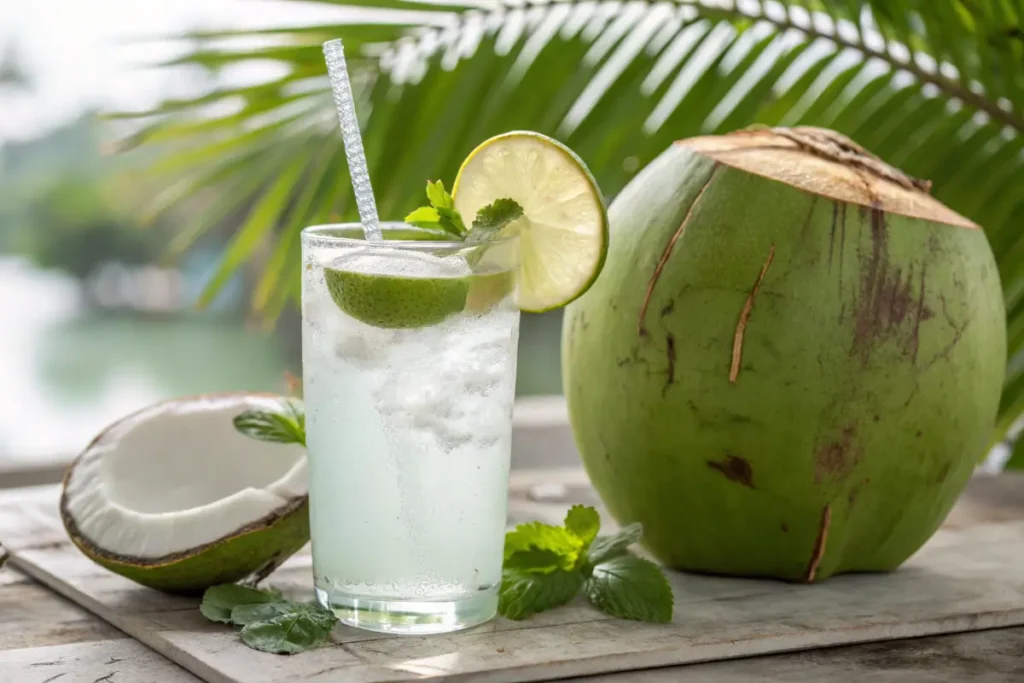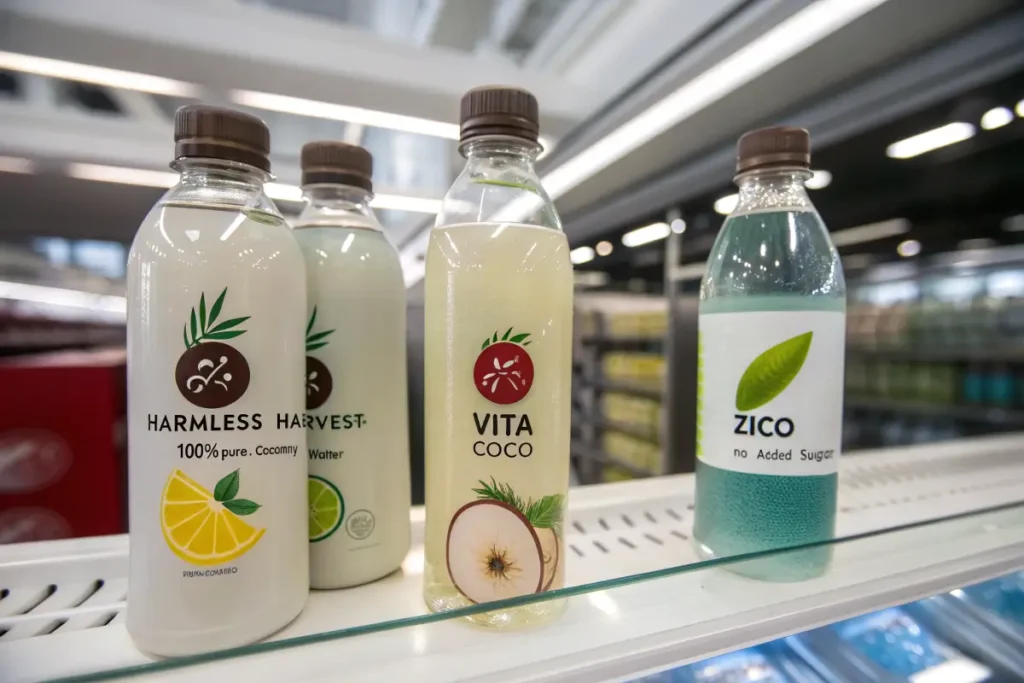Coconut Water Drink: Benefits, Uses, and How to Enjoy It Best

Introduction
The first time I tasted coconut water drink, I was on a tropical vacation, sweating under the sun. A street vendor handed me a fresh coconut, straw poking through its shell. One sip, and I was hooked! It was light, naturally sweet, and incredibly refreshing.
Since then, coconut water has become a go-to drink for hydration, digestion, and overall wellness. It’s packed with natural electrolytes, making it a healthier alternative to sugary sports drinks. But beyond quenching thirst, this tropical elixir has many health benefits, from boosting heart health to aiding digestion.
Curious about how coconut water drink can benefit you? Let’s start by understanding what it really is and why it stands out from other beverages.
Part 1: What is Coconut Water?
How Coconut Water is Different from Coconut Milk
People often confuse coconut water with coconut milk, but they’re entirely different.
- Coconut water is the clear, slightly sweet liquid found inside young green coconuts. It’s naturally low in calories and packed with electrolytes like potassium, sodium, and magnesium.
- Coconut milk, on the other hand, is made by blending coconut meat with water. It’s thick, creamy, and high in healthy fats, making it great for cooking but not ideal for hydration.
In short, if you want a refreshing and hydrating drink, go for coconut water drink. If you’re looking for a rich, creamy base for smoothies or curries, coconut milk is the way to go.
The Natural Composition of Coconut Water (Electrolytes & Nutrients)
One of the main reasons coconut water drink is so popular is its unique nutritional profile. It’s often called “nature’s sports drink” because of its electrolyte balance, which helps with hydration and muscle recovery.
Here’s what makes it special:
Potassium – Helps regulate blood pressure and muscle function.
Magnesium – Aids in muscle relaxation and energy production.
Sodium – Maintains fluid balance and prevents dehydration.
Calcium – Supports bone health and nerve function.
With this natural electrolyte blend, coconut water drink is a perfect post-workout hydrator or a daily wellness boost.
How Coconut Water is Harvested and Processed
The process of getting coconut water from tree to bottle is surprisingly simple:
- Harvesting – Farmers handpick young green coconuts, typically between 5-7 months old, when the water content is highest.
- Extraction – The coconut is cracked open, and the clear liquid is collected.
- Filtration & Packaging – To ensure safety and freshness, most commercial coconut water drinks go through minimal processing before being bottled.
For the freshest experience, drink straight from a coconut! However, store-bought versions are convenient and widely available. Just be sure to choose one with no added sugars or preservatives for the best health benefits.
If you’re interested in other refreshing drinks, check out this fresh pineapple juice guide for another tropical hydration option!
Part 2: Amazing Health Benefits of Coconut Water
Coconut water drink isn’t just a tasty refreshment—it’s loaded with natural electrolytes, vitamins, and antioxidants that offer a range of health benefits. Whether you’re an athlete, a wellness enthusiast, or someone looking for a natural energy boost, this drink has something for everyone.
Why This Tropical Drink is Good for You?
Yes! Coconut water drink is considered one of the best natural hydration sources. Unlike sugary sports drinks, it contains essential minerals like potassium, magnesium, and calcium, which help the body:
- Replenish lost fluids after exercise or illness.
- Balance electrolytes and prevent dehydration.
- Reduce fatigue by providing a natural energy boost.
According to Healthline, coconut water drink is an excellent alternative to processed beverages, as it supports heart health, digestion, and even skin health.
Supports Heart & Kidney Health
Regularly drinking coconut water can improve cardiovascular and kidney function:
- Heart Health: Studies show that coconut water drink may help lower blood pressure due to its high potassium content. It also supports healthy cholesterol levels.
- Kidney Health: Research from NCBI suggests that coconut water may reduce the formation of kidney stones by preventing crystal buildup in the kidneys.
Boosts Digestion & Metabolism
If you experience bloating or digestion issues, adding coconut water drink to your diet might help:
- The natural enzymes in coconut water aid gut health and digestion.
- It’s low in calories, making it an excellent weight-loss-friendly beverage.
- It can help prevent acid reflux and bloating by maintaining pH balance in the stomach.
Part 3: How to Make Coconut Water Taste Better
Some people find coconut water drink a bit mild or slightly nutty. If you’re not a fan of the taste, don’t worry—you can mix it with other flavors to make it more enjoyable!

What Can You Mix with Coconut Water?
Adding natural ingredients can enhance the flavor without sacrificing health benefits. Try these delicious combinations:
- Lemon & Coconut Detox – Add fresh lemon slices and a pinch of sea salt for a refreshing cleanse.
- Tropical Fruit Blend – Mix this natural hydrator with pineapple or mango juice for a tropical twist.
- Mint Cooler – Add fresh mint leaves and crushed ice for a cooling effect.
Best Coconut Smoothie Combinations
Want a nutrient-packed beverage? Use this electrolyte-rich refresher as a smoothie base instead of regular water or milk!
- Tropical Coconut Smoothie – Blend it with banana and mango for a creamy delight.
- Detox Green Blend – Combine this natural drink with spinach, cucumber, and lemon juice for a hydrating detox.
- Berry Antioxidant Mix – Blend with strawberries, blueberries, and Greek yogurt for a refreshing, nutrient-rich smoothie.
By experimenting with different flavor combinations, you can enjoy this hydrating beverage in new and exciting ways while still reaping its health benefits.
Part 4: Side Effects & When to Avoid Coconut Water Drink
While coconut water drink is a natural and healthy beverage, drinking too much or consuming it under certain conditions may cause side effects. Let’s explore when you should be cautious.
Why Do I Feel Dizzy After Drinking Coconut Water?
If you’ve ever felt lightheaded or dizzy after drinking coconut water drink, there’s a reason for it:
- Lowers Blood Pressure – Coconut water drink is naturally rich in potassium, which can lower blood pressure. If you’re prone to low blood pressure (hypotension) or take medications for hypertension, be mindful of your intake.
- Electrolyte Imbalance – Drinking too much coconut water at once can alter electrolyte levels, leading to mild dizziness or fatigue.
- Diuretic Effects – It has mild diuretic properties, meaning it encourages urination, which can sometimes reduce hydration rather than increase it.
If you experience dizziness after drinking coconut water drink, try reducing your intake or pairing it with a meal.
Who Should Limit Their Coconut Water Intake?
Though coconut water is generally safe, some people may need to limit or avoid it:
- People with Kidney Disease – Since this electrolyte-rich drink is high in potassium, those with kidney problems should consult a doctor before consuming it.
- Diabetics – While it contains natural sugars, drinking too much may affect blood sugar levels. It’s best to stick to unsweetened versions.
- Athletes Relying on Sports Drinks – Although this tropical hydrator is a great natural alternative, it doesn’t provide the same sodium levels as traditional sports drinks, which some high-endurance athletes may require.
Like anything, moderation is key. If you have any medical conditions, it’s always best to check with a health professional before making it a daily habit.
Part 5: The Correct Way to Drink Coconut Water
Organic coconut hydration is best enjoyed at the right time and in the right amount to maximize its benefits. Let’s break it down.
What is the Correct Way to Drink Coconut Water?
If you want to get the most out of your coconut water, here are some expert-backed tips:
- Best Time to Drink – Morning is ideal since it helps hydrate your body and aids digestion on an empty stomach.
- Post-Workout Hydration – If you’ve been sweating a lot, coconut water drink is an excellent rehydration option due to its natural electrolytes.
- Limit Your Intake – While it’s healthy, stick to 1-2 cups per day to avoid excess potassium intake.
Coconut Water vs. Other Hydration Drinks
How does coconut water drink compare to other popular hydration choices?
| Drink Type | Benefits | Best For |
|---|---|---|
| Coconut Water | Natural electrolytes, low calories | Daily hydration, workouts |
| Sports Drinks | Higher sodium & sugar | Intense exercise recovery |
| Aloe Vera Juice | Supports digestion & detox | Gut health & skin benefits |
| Plain Water | Essential hydration, zero calories | Everyday drinking |
If you’re looking for natural hydration without added sugars, coconut water drink is a great choice. However, for intense exercise, you may need additional sodium from sports drinks or balanced meals.
Part 6: Where to Find the Best Coconut Water

Finding high-quality organic coconut hydration can be tricky with so many options on the market. Some brands add preservatives, artificial flavors, or too much sugar, which can take away from its natural benefits. To help you make the best choice, here’s what to look for and where to buy it.
Trusted Brands for Pure and Natural Hydration
When shopping for a coconut water drink, keep these tips in mind:
100% Pure Coconut Water – Choose brands that contain only coconut water, with no added sugars or artificial flavors.
Cold-Pressed or Fresh-Pressed – These retain more nutrients and a natural taste than heat-pasteurized versions.
No Preservatives – Look for brands that are as close to fresh as possible.
From Young Green Coconuts – These provide the best flavor and electrolyte content.
Here are some of the best coconut water drink brands known for their purity and taste:
- Harmless Harvest – Organic, raw, and cold-pressed, keeping it close to fresh coconut water.
- Vita Coco – One of the most popular brands, offering 100% coconut water with no preservatives.
- ZICO – A good low-calorie, natural option with a clean, crisp taste.
- C2O – Made from young Thai coconuts, giving it a naturally sweeter taste.
Should You Choose Fresh or Bottled?
While bottled coconut water drink is convenient, fresh coconut water is often the best choice for purity and taste. Here’s a quick comparison:
| Type | Pros | Cons |
|---|---|---|
| Fresh Coconut Water | Pure, no preservatives, best taste | Short shelf life, less convenient |
| Packaged Coconut Water | Easy to store, portable, widely available | May contain added sugar or preservatives |
For the best experience, try fresh coconut water when available. If buying bottled, check the label to make sure it’s pure coconut water with no unnecessary additives.
Part 7: Frequently Asked Questions (FAQs)
Still have questions about coconut water drink? Here are some common FAQs to clear things up!
1. Is drinking coconut water good for you?
Yes! Coconut water drink is packed with natural electrolytes, making it a great hydration option. It’s also low in calories, sugar, and fat, making it healthier than sodas or artificial juices.
2. What can you mix with coconut water to make it taste better?
Some people find coconut water to be mild or slightly nutty in taste. To enhance the flavor, try mixing it with:
- Fresh lime or lemon juice for a zesty twist.
- Mint leaves and honey for a refreshing touch.
- Pineapple or mango juice for a tropical blend.
3. Why do I feel dizzy after drinking coconut water?
Feeling lightheaded? Coconut water drink contains potassium, which can lower blood pressure. If you already have low blood pressure or take medication for hypertension, drinking too much coconut water might cause dizziness.
4. What is the correct way to drink coconut water?
For best results, drink coconut water:
- In the morning for hydration and digestion.
- After exercise to restore lost electrolytes.
- In moderation (about 1-2 cups per day) to avoid excess potassium.
Coconut water drink is a versatile, healthy, and hydrating beverage. Whether you enjoy it plain, in smoothies, or as a post-workout refresher, it’s a natural way to support your overall health.
Print
Coconut Water Drink
A refreshing and hydrating drink packed with natural electrolytes, coconut water is a healthy alternative to sugary beverages.
- Total Time: 5 minutes
- Yield: 1 serving
Ingredients
- Fresh coconut water
- Lemon slices (optional)
- Mint leaves (optional)
- Pineapple juice (optional)
- Mango juice (optional)
- Honey (optional)
Instructions
- Harvest a young green coconut and crack it open.
- Pour the fresh coconut water into a glass.
- Enhance the flavor with optional add-ins like lemon slices, mint leaves, or fruit juices.
- Serve chilled or with ice for a refreshing drink.
Notes
For the best taste, choose 100% pure coconut water with no added sugars or preservatives.
- Prep Time: 5 minutes
- Cook Time: 0 minutes
- Category: Beverage
- Method: Raw
- Cuisine: Tropical
- Diet: Vegan
Nutrition
- Serving Size: 1 serving
- Calories: 45
- Sugar: 9g
- Sodium: 105mg
- Fat: 0g
- Saturated Fat: 0g
- Unsaturated Fat: 0g
- Trans Fat: 0g
- Carbohydrates: 9g
- Fiber: 0g
- Protein: 0g
- Cholesterol: 0mg
Keywords: coconut water, hydration, electrolyte drink, tropical drink, refreshing beverage
